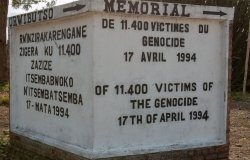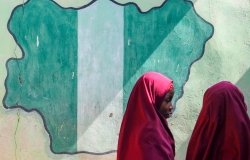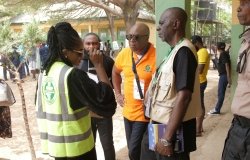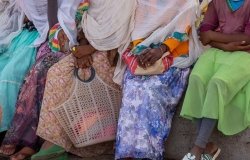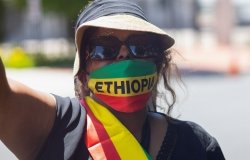
A blog of the Africa Program
The Crucial Role That Regional Actors Can Play in the 2023 Zimbabwe Election
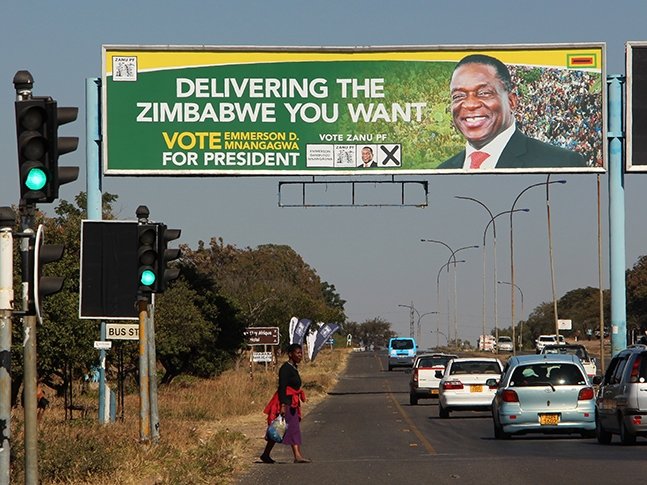
In 2023, Zimbabweans will head to the polls to vote in the general election for the president and both houses of parliament. Many civil society organizations within Zimbabwe fear that the relative peace achieved following the 2018 election is no longer attainable. There is no indication of any changes coming from President Mnangagwa or the Zimbabwe African National Union-Patriotic Front (ZANU-PF). So the onus to promote peace falls, somewhat, on regional actors who have historically turned a blind eye to issues within Zimbabwe. Stability in Zimbabwe is no longer a Zimbabwe issue. As insurgencies in Mozambique begin to threaten the region, an unstable Zimbabwe further weakens the security of the neighboring Southern African Development Community (SADC) countries. To maintain stability, support democratization, and mitigate electoral violence, key regional actors, specifically South Africa and other SADC countries, have to take a stronger stance on Zimbabwe.
We have spent the last six months conducting a comprehensive Electoral Violence Analysis on the upcoming 2023 Zimbabwe election based on the Electoral Violence Assessment Framework of the U.S. Department of State's Bureau of Conflict and Stabilization Operations. We interviewed experts on Zimbabwe both in the U.S. as well as from NGOs in the country. Through our analysis, we were able to identify key risks for violence in the upcoming elections. One of the most likely factors that we believe could lead to electoral violence is distrust in the electoral institutions linked to potential fraudulent results and institutional capture by ZANU-PF. The distrust could spark protests, which would inevitably lead to conflict between civilians and police. In order to mitigate electoral violence and take steps toward democratic stability in Zimbabwe, regional actors will need to leverage their relationship with Zimbabwe to push for electoral reforms.
The elections in 2023 will be the second election in which incumbent Emmerson Mnangagwa will be on the ballot. Mnangagwa still has a lot to prove, as many civil society organizations believe he has abandoned the reformist rhetoric of his successful 2018 electoral campaign in order to maintain power. Mnangagwa uses his control over both the security sector and the judiciary to cripple the opposition. Public demonstrations organized by opposition leader Nelson Chamisa protesting current economic hardships — including declines in jobs, wages, and service delivery — have been met with force by the security sector. COVID-19 has also contributed to the violent interactions between security forces and citizens, as frustrated Zimbabweans have begun to oppose government-mandated lockdowns. Politically, Mnangagwa has used the ZANU-PF controlled courts to strip power away from Chamisa's wing of the Movement for Democratic Change (MDC) party. This exacerbates the very real criticisms of the electoral system, which include widespread claims that all institutions are controlled and operated by incumbent loyalists. It is imperative that Zimbabweans perceive electoral institutions like the Zimbabwe Electoral Commission (ZEC) and the judicial system as independent. Otherwise, Zimbabweans will likely take to the streets after the 2023 election to protest any perceived or real malfeasance, likely to be met by security forces. Reforming the ZEC and the judicial system are tangible steps the Zimbabwean government can take to reduce the possibility of violence in 2023.
Given Zimbabwe's divisive relationship with the United States and the United Kingdom, regional actors like South Africa should play a more prominent role in mitigating violence in Zimbabwe. South Africa and other SADC countries can learn from last year's successful elections in Malawi and apply pressure on the Zimbabwean government by encouraging Mnangagwa to commit to electoral reforms such as shoring up judicial independence and forming an independent election management body.
Many international and domestic observers lauded the Malawian judicial decision to annul the 2019 election and re-run it in 2020, and praised Malawi's Constitutional Court for exhibiting total independence in the face of overt attempts to corrupt the election. This was an incredible milestone for Malawi, which ranked 123 out of 189 in the 2019 Corruption Perceptions Index. In June 2020, the results of the re-run election were announced and challenger Lazarus Chakwera was declared the winner. Malawi's election highlighted the importance of a strong, independent judiciary and civil society, particularly in a case where international observers were absent due to COVID-19. Zimbabwe's Mnangagwa, who has always been critical of international observers, was quick to applaud Malawi for its successful election, emphasizing the fact that international election observers were absent. What Mnangagwa failed to acknowledge was that Malawi's institutions stood up to corruption and the incumbent's heavy hand. In short, the Malawi case is now a model that regional actors can use to help support electoral reforms in Zimbabwe.
South Africa is a key regional actor that can influence positive electoral reforms in Zimbabwe for a number of reasons. First, the two countries share a border and South Africa is Zimbabwe's largest trade partner. Second, South Africa is the biggest economy in the region and has substantial influence with other SADC countries. Third, South African president Cyril Ramaphosa is the current president of the African Union and has sway in the continent's regional bodies. Fourth, South Africa is directly affected by political and economic issues in Zimbabwe as it is the recipient of most Zimbabweans who flee the country.
South Africa has long turned its back on the Zimbabwean people in favor of its political leaders. Dating back to former president Thabo Mbeki, South Africa has been criticized for ignoring human rights abuses in Zimbabwe. Ramaphosa, on the other hand, has shown signs of potentially taking a stronger stance on domestic issues within Zimbabwe. If South Africa is to be taken seriously by its Western allies, it needs to leverage its strong connection with Zimbabwe and pressure Mnangagwa to carry out the electoral reforms he has promised. This would help mitigate electoral violence in 2023 and lead to more stability in the region.
Although Zimbabwe's elections are still a couple of years away, many experts believe that in order to make any impactful change, the country's electoral reforms must begin well in advance. Zimbabwe often goes unnoticed by powerful Western nations, and the pleas of Zimbabweans are often ignored by their African neighbors. Yet Zimbabwe is a resource-rich, regionally strategic country whose stability directly impacts that of its neighbors. If SADC is to achieve its democratic and development goals, the organization must make serious changes in its efforts to assist democracy-building and the mitigation of electoral violence in Zimbabwe. Stability in Zimbabwe is good for the region as a whole, especially as Mozambique struggles with an ongoing insurgency in the country's northern region, a threat that many argue also requires a regional response.
Alexander Mederosis a Master of Science in Foreign Service student at Georgetown University School of Foreign Service. Michael Bongani Reinders is an MA in Democracy and Governance student at Georgetown University. He is a Fulbright student from South Africa.
Photo credit: Election billboards show then ZANU-PF candidate, and current president Emmerson D. in Bulawayo, Zimbabwe. Credit: Herb Klein/Shutterstock. Source: https://www.shutterstock.com/image-photo/bulawayo-zimbabwe-june-26th-2018-election-1121867723.
About the Authors
Alexander Mederos
Michael Bongani Reinders

Africa Program
The Africa Program works to address the most critical issues facing Africa and US-Africa relations, build mutually beneficial US-Africa relations, and enhance knowledge and understanding about Africa in the United States. The Program achieves its mission through in-depth research and analyses, public discussion, working groups, and briefings that bring together policymakers, practitioners, and subject matter experts to analyze and offer practical options for tackling key challenges in Africa and in US-Africa relations. Read more



